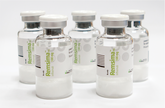Biosimilars
Expediting FDA approvals for biosimilars
A number of recommendations for the US Food and Drug Administration (FDA) to simplify biosimilar licensing laws, and thus make biosimilars more accessible, are offered in a recent review [1]. Recommendations include allowing smaller batch sizes for testing, encouraging substitution for naïve patients, and removing the requirement for bridging studies.
FDA advisers recommend approval of rituximab biosimilar CT-P10
US Food and Drug Administration (FDA) advisers have voted unanimously to recommended approval for CT‑P10, a biosimilar version of Roche’s MabThera/Rituxan (rituximab). If approved by FDA, this would be the first rituximab biosimilar approved in the US.
Phase III trial for subcutaneous Remsima completed
Celltrion Healthcare (Celltrion) announced on 29 August 2018 that it had completed a phase III study with the subcutaneous (SC) version of its infliximab biosimilar Remsima (CT‑P13).
Comments on FDA’s public meeting on biosimilars
Comments made at the US Food and Drug Administration’s (FDA) recent meeting on biosimilars included a call for interchangeability information in the Purple Book, criticism of FDA’s use of arbitrary suffixes and a request to waive bridging studies for biosimilars.
Two darbepoetin alfa biosimilars submitted to Japan’s PMDA
Two South Korean firms have announced that they have submitted applications for approval of their proposed darbepoetin alfa biosmilars to Japan’s medicines regulatory agency, the Pharmaceuticals and Medical Devices Agency (PMDA).
Reasons for switching to biosimilars and immunogenicity
Authors from French universities and hospitals discussed the evidence and issues associated with switching from originator biological to biosimilars [1].
Stakeholder perspectives on biosimilars in oncology
Monoclonal antibody biosimilars represent a novel advance in the field of oncology, and their integration into routine clinical practice present challenges for clinicians, nurses, patients and regulators. Researchers therefore investigated the perspectives stakeholders including a clinician, specialist nurse, patient advocate, regulator and economist on optimizing the uptake of monoclonal antibody biosimilars in the treatment of cancer [1].
EC approval for adalimumab and pegfilgrastim biosimilars Hulio and Udenyca
In September 2018, adalimumab biosimilar, Hulio, and pegfilgrastim biosimilar, Udenyca, received European Commission (EC) approval.
Pharmacokinetics of CT-P6 in patients with HER2+ early-stage breast cancer
Researchers from Celltrion presented data that support the pharmacokinetic (PK) similarity between trastuzumab biosimilar CT‑P6 and originator trastuzumab (Herceptin) [1].
Biocon’s biosimilars plant gains clearance from FDA
India-based biologicals specialist Biocon has stated that its biosimilars plant has received a clean bill of health, indicating that it is now compliant with US Food and Drug Administration (FDA) manufacturing requirements.













